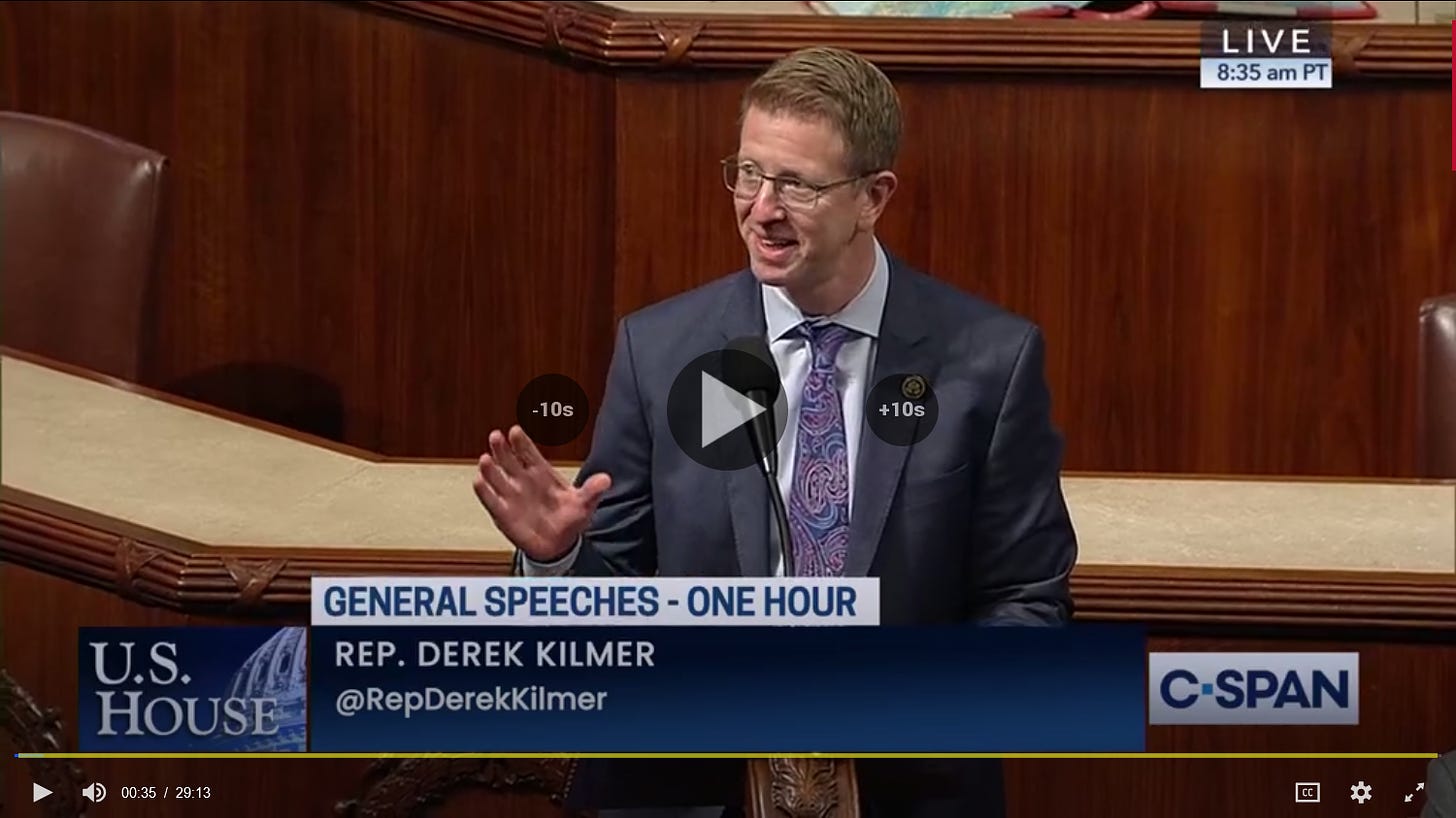Congress in the Twilight: Navigating Big Decisions as the 118th Term Ends
Razor-thin margins, factional feuds, and a domineering president shape the road ahead for 2025
The sun is setting on the 118th Congress. Twenty-five days remain until January 3, 2025, when the new Congress will be sworn in.
In the House of Representatives, Republicans will hold 220 seats to Democrats' 215, a margin that will grow thinner as several members leave for the Trump administration. Illness, missed flights, bad luck, and other factors will strain Republican's notional control during the first hundred days of the Trump administration. This will be exacerbated by the strains among the various factions within the party, although we may see some Democratic factions come to the rescue of the Republicans. A big early test will be the debt ceiling vote, an issue long demagogued by Republicans that they will squarely own.
The Senate's margin of 53-47 will give Republicans leeway for many issues they care about, addressable through reconciliation (for budget matters) or majoritarian votes (for Executive branch nominees and the courts). Prior senates would reject many of Trump's nominees as unqualified, but Republican senators appear less willing to publicly push back and some Democrats appear willing to allow some of the nominees through.
In legislation
Over the next few weeks, the House and Senate will address both the National Defense Authorization Act and (most likely) a "short term" Continuing Resolution to keep the government open for a few months until new appropriations bills can be drafted. Good luck with that.
The House published the NDAA and an accompanying explanatory statement on its document repository Saturday night (it may take some time to show up on Congress.gov), with the bill clocking in at 1,813 pages. A quick skim identified new whistleblower protections in section 6701 and I spotted a number of bills jammed into its text. The legislation was anticipated to be pre-conferenced with the Senate, although I do not know the extent to which that occurred. The House Rules Committee will consider a rule at a meeting this Monday that will control the legislation's consideration on the floor. However, there's a good chance enough Republican defections on the floor will mean the bill will have to be reconsidered on suspension, where Democrats can be expected to put it over the top but perhaps will demand some concessions.
The Senate will take up the NDAA in short order, although it's unclear what a time agreement would look like and what amendments would be considered. One can imagine the Senate passing its own version of the NDAA and jamming the House. On Friday a Washington Post opinion piece written by the Editorial Board suggested the Senate would take up the PRESS Act this week, perhaps by attaching it to the NDAA. The PRESS Act is a crucial law to protect press freedom, one that passed unanimously in the House, but an unfortunate Trump tweet has made its enactment more difficult.
Congress will also have to move legislation to fund the government before a previous continuing resolution expires on December 20th. We do not yet know the form of that legislation, although there's a good chance it will be a short term continuing resolution. If so, the CR may contain other provisions, such as spending for natural disasters, funds for which were depleted by a spate of major storms earlier this year. Some hardline House Republicans, including the Speaker, have indicated a dislike for CRs, but once again Republicans likely cannot move the legislation into law without the help of Democrats. This provides an opportunity to negotiate — and a challenge to Johnson, who may have to spurn the party's right wing to make it happen.
Multi-stakeholder forums
I spent last week in Brasília at a regional meeting of the Open Government Partnership, an effort to support governments and civil society in collectively making agreements to advance open government in their countries. I had an opportunity to visit the Brazilian Congress and will have more to report later – including new efforts by some nations to involve their parliaments in making collaborative plans for improved legislative transparency. In the context of the United States, all are welcome to attend and comment at this Wednesday's Open Government Federal Advisory Committee meeting, set for 1pm ET. (I serve as chair of the OG FAC).
Public participation in AI design and implementation is the focus of a 1pm meeting today, hosted by the White House's Office of Science Technology Policy. Register here.
The Congressional Data Task Force, a twelve-year old collaboration between the U.S. Congress and civil society, will hold a hybrid public meeting this Thursday at 2pm. Click on the link to RSVP for in-person or virtual attendance. I've attended every one of the quarterly meetings and can say without reservation that this is the most productive forum I've participated in. Its focus is opening up the legislative process to the public and modernizing congressional technology. I've summarized the previous meeting on my congressionaldata.org website, which contains links to summaries of all the prior meetings and much more.
Congressional tech + modernization
Artificial intelligence is one of the many issues addressed at the Congressional Data Task Force. As a matter of fact, I'm keeping track of matters of AI and parliaments in the U.S. context at this wiki page. There's a new report out this past week from the Inter-parliamentary Union on Guidelines for AI in parliaments that I am sure will be of interest to many. Its focus is to provide a "comprehensive framework for parliaments to understand and implement AI responsibly and effectively."
The Senate announced two key players relevant to its operations, including technology. Incoming Majority Leader Thune announced the next Secretary of the Senate will be Jackie Barber and the next Sergeant at Arms will be Jennifer Hemingway.
The Secretary of the Senate is largely responsible for managing the technology and documents related to legislation in the Senate, and is similar to the House's Clerk. According to Legistorm, Jackie Barber currently serves as the Republican Staff Director for the Senate Rules Committee under Sen. Fischer, and had previously served as Chief Counsel for the committee under Sen. Blunt. She has served as chief counsel on several other committees in the Senate as well as Counsel for the House Ethics Committee and as deputy general counsel for the NRCC. As Sen. McConnell will replace Sen. Fischer as the Republican leader of the Rules Committee, it would not be surprising if he picked his own person to serve as staff director; thus it makes sense to elevate Ms. Barber to serve in this administrative role.
The Senate Sergeant at Arms is the chief law enforcement and protocol officer, managing many of the support services in the Senate. They are the equivalent of the House's Chief Administrative Officer and House Sergeant at Arms. According to Legistorm, Jennifer Hemingway currently serves as the Chief of Staff in the Capitol Division of the Senate SAA. She previously served as acting and deputy SAA and was House Operations Director for Speaker Paul Ryan. She served in a number of important roles in the House, including staff director of the House Oversight Committee and various roles within that committee, staff director for a HSGAC subcommittee, as well as for various members of the House.
Congratulations and good luck to Ms. Barber and Ms. Hemingway.
Odds
Incoming President Trump said lawmakers who served on a House committee focused on his role in the Trump insurrection should be jailed. You can watch the Meet the Press interview and read the transcript. Specifically: everybody who "voted in favor" should go to jail, and that they "committed a major crime." This outrageous assertion may run into trouble being implemented as members of Congress enjoy immunity from prosecution for official actions under the Constitution's Speech or Debate clause. Per the explanation from CRS's Constitution Annotated, it provides "Members of Congress and their aides with immunity from criminal prosecutions or civil suits that stem from acts taken within the legislative sphere." I leave it to others to explore whether the House would intervene in an attempted prosecution.
January 6th insurrectionists also will be pardoned on his first day in office, according to Trump. If you read the interview, Trump claims that the insurrectionists have suffered and that some people from Antifa may have been involved. He also claimed the insurrectionists who pleaded guilty to assaulting police officers "had no choice." He also said that video of the insurrection was not released to the public. In reality, the insurrectionists were incited by Pres. Trump in an effort to stop the ballot count and overthrow Congress. They made use of weapons and engaged in violence against Capitol Police and others. Thousands of hours of video of those assaults are available on the House Administration Committee's website.
Ends
The House and Senate have posted their respective floor calendars for 2025. House Republicans published the calendar in a not-particularly useful PDF format, but House Democrats have published it in a digital format that you can add to your Outlook or Gmail calendars. The Senate 2025 calendar is available as a PDF file but not in an ical format. Someone should ask the Library of Congress to publish a combined digital calendar. If they don't, I will.
Kacper Surdy, the very-online British Congressional parliamentary procedure maven, was interviewed by the Hansard Society.
Changes in democratic committee leadership in the House is too much to explore for today, but I'll note that Rep. Nadler withdrew from consideration to serve as leader of the House Judiciary Committee, giving way to Rep. Raskin's bid to switch as leader of Oversight to Judiciary. (This leaves a contest for the ranking member position on Oversight.) Similarly, Rep. Grijalva will not seek to remain as ranking member for Natural Resources, setting the way for his challenger Jared Huffman to take that role. There is also an open question as to whether Rep. Scott will continue as the ranking member of the Agriculture committee in light of ongoing concerns about his ability to do so
Being chosen to lead a committee is in part about seniority, in part about ability, in part about fundraising, and in part about the patronage structure that exists within each party. Nadler was known for pushing for Trump's impeachment, irritating then Speaker Pelosi. Rep. Huffman is from California. The Steering Committee, which does committee selection, is dominated by leadership.
Rep. Derek Kilmer, who co-led efforts to modernize Congress at the House Select Committee on Modernization and the current Modernization Subcommittee – the "fix Congress committee" – was honored alongside Rep. William Timmons with the 2024 Freedom Award by the Capitol Historical Society. Speaker Mike Johnson delivered a keynote address. In addition, Betsy Wright Hawkins, a longtime congressional staffer and leader of the congressional modernization space at Democracy Fund, was honored as well.
I note all this in part because Rep. Kilmer gave his farewell remarks last week on the House floor. You can watch them below.




